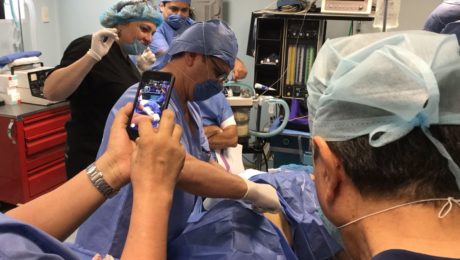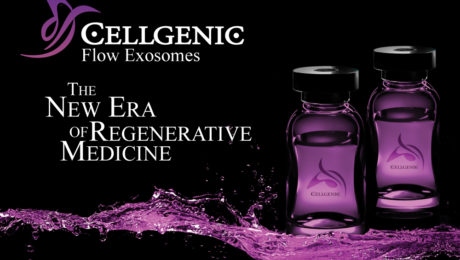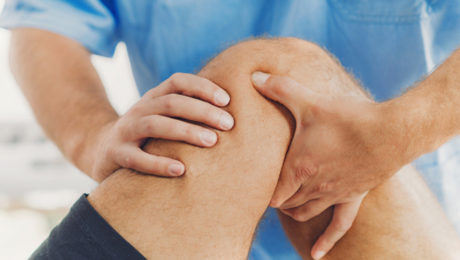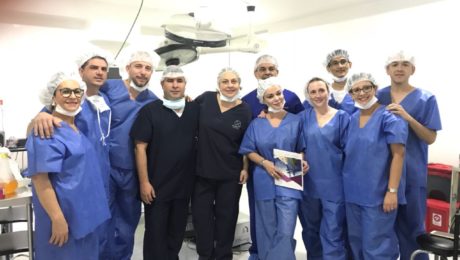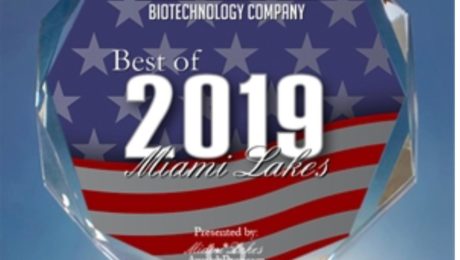Global Stem Cells Group Enters Training Agreement with Moroccan Hospital
The agreement between Global and CHU Mohammed VI in Marrakech will help enhance staff preparation and clinical offerings in regenerative medicine
MIAMI LAKES, Florida— Stem Cells Training Inc., a subsidiary of the Global Stem Cells Group (GSCG), has announced that it has signed an onsite training agreement with Centre Hospitalo-Universitaire Mohammed VI Marrakech (CHU). GSCG faculty will travel to Marrakech, Morocco to provide this invaluable two-day training to CHU’s staff on February 14 and 15, 2020.
The agreement names the GSCG as CHU’s provider of training for the facility’s regenerative medicine staff. Through the deal, the GSCG will provide preparation and education in the latest regenerative medicine techniques and stem cells protocols, focusing on those utilizing adult stem cells and birth tissue derived from stem cells. In addition to on-site training, the agreement also names the GSCG as CHU’s provider for all necessary equipment to implement regenerative medicine treatments.
The additional training and supplies offered through the agreement will allow CHU to incorporate the industry’s most effective stem cells protocols into the hospital’s treatment options.
The Centre Hospitalo-Universitaire Mohammed VI is a regional leader in quality patient care, student education, physician training, and innovative medical research. Located in Marrakech, CHU provides the bustling city with short-, medium-, and long-range care solutions. Counted among its innovative institutional projects, CHU’s Culture and Health program is committed to making the hospital a more human environment for patients seeking care.
“The agreement between the Global Stem Cells Group and the Centre Hospitalo-Universitaire Mohammed VI Marrakech is an important one for both partners,” said Benito Novas, CEO of the Global Stem Cells Group. “As a university institution, CHU is interested in leading clinical trials to prove the safety and efficacy of regenerative medicine treatment protocols—something the GSCG has a vested interest in. This agreement will allow us to train hospital staff to offer cutting-edge treatments to patients in Morocco while helping stem cells treatments gain more traction globally, making them more viable options for physicians to incorporate into their practices.”
With the newly signed agreement, the GSCG continues to advance its mission to expand its presence across the global, especially focusing on North America and the Middle East. Physicians looking to grow their practices by offering regenerative medicine treatments can benefit from the GSCG’s trainings, which are conveniently held onsite at physicians’ home facilities, no matter where they are located globally.
To learn more about the onsite training opportunities offered by the Global Stem Cells Group, visit https://www.stemcelltraining.net/onsitetraining/. To learn more about the Centre Hospitalo-Universitaire Mohammed VI Marrakech, visit www.chumarrakech.ma.
- Published in Press Releases
Global Stem Cells Group Releases New Product to Meet Growing Demand for Birth Tissue Derived Compounds
Cellgenic Flow Exosomes has a wide range of therapeutic implications, including hair loss and pain management
MIAMI LAKES, Florida—The Global Stem Cells Group (GSCG) has announced the release of a new product in response to growing demands from regenerative medicine practitioners for cellular products derived from birth tissue. The product, Cellgenic Flow Exosomes, is 100% natural and is available in a 1 mL vial comprised of 5 billion exosomes per mL and is currently manufactured in Mexico and in Global’s US-based facilities.
As the popularity and efficacy of stem cells treatments increase across the globe, the demand for cellular products like Cellgenic have also increased. With this demand in mind, the GSCG–a global leader in stem cell research, patient application, and physician training–sought to create an innovative cellular product to meet the needs of physicians looking to offer regenerative medicine treatments in their existing practices.
Cellgenic is primarily comprised of exosomes, cell-derived non-particles that play a pivotal role in cell-to-cell communication that are involved in a wide range of physiological processes. Exosomes play an important role in the transfer of proteins, mRNA, miRNA, and other bioactive molecules between cells and regulate gene expression in recipient cells, thus influencing various molecular pathways.
An increasing amount of attention has been paid to exosomes in recent years thanks to the wide range of therapeutic implications they may hold. Some of the most effective uses for exosomes have come in hair therapy and pain management.
Using Cellgenic as a treatment for hair loss has resulted in prominent hair growth results in both men and women. It is highly recommended for those who are too young for hair transplant surgery and for those within the earlier stages of the hair loss cycle.
In terms of pain management, Cellgenic has shown promise in delivering relief from pain and discomfort and may potentially stimulate repair as opposed to blocking or masking them. Common pain and degenerative conditions that Cellgenic may help treat include osteoarthritis, knee pain, shoulder pain, nerve pain, tendonitis, and slow- and non-healing wounds and burns.
For doctors who are interested in learning more about Cellgenic, the GSCG has developed an online course to provide them with the relevant knowledge needed to make a decision about incorporating allogeneic compounds into their treatment protocols.
“Global’s newest product innovation, Cellgenic Flow Exosomes, is an exciting addition to our product portfolio,” said Benito Novas, CEO of the Global Stem Cells Group. “Our goal is to continually innovate and meet the demands of physicians practicing regenerative medicine by providing cutting-edge therapies for those suffering from degenerative diseases. The release of our Cellgenic product accomplishes this goal while also contributing to our mission of being a leader in stem cells research.”
To learn more about Cellgenic Flow Exosomes, visit https://cellgenic.com/.
- Published in Press Releases
Knee replacement alternatives
One of the amputating surgeries in the field of medicine is a knee replacement. It involves removing the knee joint and replacing it with a modified prosthesis. However, several modifications of this surgery have been introduced into the high-powered world of surgery, including several alternatives for knee replacement. In this article, we are going to review the several modifications and knee replacement alternatives therein.
What is Knee Replacement?
Knee replacement, also known as knee arthroplasty, is a surgical procedure that involves the amputation or cutting out of a knee joint, the bones reams by a doctor, especially due to accidents or joint ailments such as arthritis. When the bone is removed, it is then replaced with a prosthetic device. Knee replacement can be partial, where selected or affected parts of the joints can be removed, such as the medial, lateral, and anterior compartments can also be removed and replaced with a modified prosthetic.
Why Should You Be looking for a Knee Replacement Alternatives?
Due to the dynamics of the human body, what works for the goose may not necessarily work for the gander. Certain post-symptoms of a knee replacement can be unbearable for most patients.
Pain After Knee Replacement.
Due to pain in the knee joint, a lot of patients embark on this old-time surgery to help reduce the pain they feel around their knee. But it is worthy of knowing that a substantial number of these patients still continue to feel pain after this audacious surgery. In a survey done by the government, 40% of patients that underwent knee replacement experienced miniature pain for over 3-4 years, while another 44% still felt some 3-5/10 degree of pain in 3-4 years. So, it is not worthy of looking in the direction of knee replacement alternatives in order to solve knee pain.
Knee Replacement Risks.
There is a risk in everything that we do, business, taking a walk, climbing a hill. Same way, certain risks exist in knee replacement which are:
- Patients become more susceptible to heart attack and stroke immediately after knee replacement surgery.
- Increased levels of metals in the blood.
- Allergic reactions to the prosthetic material.
- Possibility of infection.
- Reduced activity of the patient as they thrive to become accustomed to the new prosthesis.
Even though social media and digital marketers paint a vivid picture of beautiful seniors riding a bike, continuing in their daily activities and hobbies, but this may not be true for everyone; in a study conducted by the government, there was seldom activity by patients after knee replacement surgery. Another study showed that patients who weren’t running before a knee replacement surgery couldn’t run after the surgery. But there are always two ways to everything; some other patients also showed an increase in physical activity after their surgery.
What are Knee Replacement Alternatives?
Steroid Injections
Steroids are made up of corticosteroids and cortisone. These corticosteroids carry out an anti-inflammatory function to prevent swelling around the knee regions as well as help reduce pain. But they do have a side effect; they destroy cartilage and may not be efficient as they are thought to be. If you are considering this knee replacement alternative, you probably should bear in mind that they do not offer long term remedies. Steroid injections are viable for knee replacement needs caused by arthritis but may proffer short-termed solutions.
Viscosupplementation
Viscosupplementation is also another knee replacement alternative. They are in the form of gels for the knee, also knowns as hyaluronic acid varying across different brands in the market, likes of SynVisc, OrthoVisc, Supartz, and Euflexxa. They are administered to the patient, but a quick question one would ask is if really the shots help. The variations of results all over the web show support both sides of the notion. But one peculiarity of these results is that none says that they are hurtful or damaging as the steroid injections rather that they give a better solution to knee joint arthritis patients. In my own experience, these injections are efficient only when administered a few times, after which they begin to diminish in effects. The first dose may offer relief for some time, but a dose a far-reaching as the sixth dose may not offer any remedial effect at all.
Knee Nerve Ablation
Knee Nerve ablation is another breakthrough in the surgical world. Knee Nerve Ablation involves the use of technology to carry out a process where the specialist probes the nerves around the joint and passes electrical energy that is used to ablate (destroy) them. The work of these nerves is to relay signals from that region of the knee to the brain. So this technique deadens these nerves, and as such, you don’t feel any pain till those nerves grow back. The research on this type of knee replacement alternative is only a handful. Hence, they cannot conclude on the long term results since most of the studies on this new breakthrough are in their early stages.
Orthobiologics
Orthobiologics incorporation around the knee regions helps to enhance the healing of the knew joint or reduce the consequent degradation of orthopedic tissues. Orthobiologics are also knee replacement alternatives and can be gotten from the patient as autologous or a donor as allogeneic. The two primary derivations of orthobiologics are the PRP and the BMC short for Bone Marrow Concentrate. Another derivation that is commonly used is derived from natal tissues as in amniotic or umbilical cord. Just as the nerve ablation, the research on this type of knee replacement is at its early stages.
Platelet Rich Plasma (PRP)
We mentioned PRP earlier while discussing orthobiologics. PRP’s stand for Platelet-rich plasma that can be gotten from the patient. They contain healing factors that allow them to foster cartilage repair as well as reduce inflammation and balance the chemical dynamics of the knee. A lot of studies support the efficiency of PRP as knee replacement alternatives but may not offer much help when the arthritis is severe.
PKA (Percutaneous Knee Arthroplasty)
PKA (Percutaneous Knee Arthroplasty) comes in handy for severe cases of arthritic pain. This procedure involves the injection of rich bone marrow concentrates gotten from the patient or from a donor into the lax ligaments or other affected areas such as damaged meniscus tissues and tendons. This procedure is intricate and uses an ultrasound and fluoroscopy guides as compared to other quick knee shot techniques. Research proves that this method works pretty well, even in extreme cases of knee arthritis. This procedure also produces a lasting effect for about 2-7 years before the need for repetition.
Here you go!! Knee replacement alternatives. You sure would want to consider some of the alternatives; likes of PKA, PRP, and Bone Marrow concentrates that proffers a long-lasting solution.
- Published in Corporate News / Blog
Stem Cells Center Set to Open Doors on Two Locations in New York State
A subsidiary of the Global Stem Cells Group, the new centers mark the group’s expansion across the US, delivering cutting-edge pain management solutions to patients
- Published in Press Releases
Global Stem Cells Group Receives 2019 Best of Miami Lakes Award
Miami Lakes Award Program Honors the Achievement
MIAMI LAKES November 14, 2019 — Global Stem Cells Group has been selected for the 2019 Best of Miami Lakes Award in the Biotechnology Company category by the Miami Lakes Award Program.
Each year, the Miami Lakes Award Program identifies companies that we believe have achieved exceptional marketing success in their local community and business category. These are local companies that enhance the positive image of small business through service to their customers and our community. These exceptional companies help make the Miami Lakes area a great place to live, work and play.
Various sources of information were gathered and analyzed to choose the winners in each category. The 2019 Miami Lakes Award Program focuses on quality, not quantity. Winners are determined based on the information gathered both internally by the Miami Lakes Award Program and data provided by third parties.
About Miami Lakes Award Program
The Miami Lakes Award Program is an annual awards program honoring the achievements and accomplishments of local businesses throughout the Miami Lakes area. Recognition is given to those companies that have shown the ability to use their best practices and implemented programs to generate competitive advantages and long-term value.
The Miami Lakes Award Program was established to recognize the best of local businesses in our community. Our organization works exclusively with local business owners, trade groups, professional associations and other business advertising and marketing groups. Our mission is to recognize the small business community’s contributions to the U.S. economy.
SOURCE: Miami Lakes Award Program
CONTACT:
Miami Lakes Award Program
Email: PublicRelations@2019localtop-selection.com
URL: http://www.2019localtop-selection.com
- Published in Press Releases

